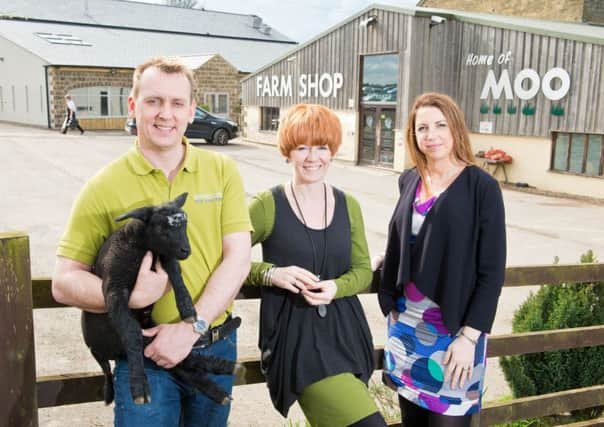Farmer Copley's records £3m turnover


While a perfect storm of low commodity prices, European support payments delays and flooding plunged much of the farming industry into crises prior to last year’s EU referendum, it did not halt plans at Farmer Copley’s in Pontefract.
The business has posted a 43 per cent rise in its annual turnover following an ambitious £1.2m project - supported with funding from the Royal Bank of Scotland - to convert a barn into a 157-seater café and restaurant, complete with private function rooms. Now complete, it also encompasses the ‘Moo’ café which used to been located inside Farmer Copley’s farm shop.
Advertisement
Hide AdAdvertisement
Hide AdWork started on the conversion in December 2015 and the finished building opened to the public six months ago. Since then, visitor numbers soar by 50 per cent compared to 12 months ago.
As a result of the changes, the café becomes the fully licensed ‘Beast’ restaurant on Thursday, Friday and Saturday evenings.
The new venue also houses the ‘The Stable’, a business meeting room for 14 people, and a private function room ‘The Baro’ with a capacity of 140 people and full conference facilities.
Twenty new jobs have been created, taking the farm’s workforce to 65 people.
Advertisement
Hide AdAdvertisement
Hide AdThe farm itself comprises of 60 acres and it is used to produce lamb, beef, pumpkins, strawberries, asparagus, rhubarb, raspberries, blackberries, eggs and liquorice which are sold in the farm shop, along with other locally sourced produce.
Owner Heather Copley said: “We are thrilled with the new venue and its popularity is proving that this was a great step for us to take. Moo is very busy every day and Beast is also proving popular, fully booked every Saturday evening and most Fridays too.
“By moving the café to its own premises we have also been able to expand the farm shop and create a dedicated retail space that is more relaxed and much better laid out. This has also proved to be a great step as we have seen sales increase in this area of the business too.
“Overall, revenues generated by the café, restaurant and farm shop have steadily increased - up £10,000 a week currently on this time last year as a result of the project.”
Advertisement
Hide AdAdvertisement
Hide AdMrs Copley praised the “excellent support” the business had from Royal Bank of Scotland during the expansion project.
Lindsay Crooks, senior relationship manager at the bank, said: “Many British farmers have had to think laterally to ensure they continue to prosper and farm diversification offers considerable scope for improving the economic viability of a farm and has become increasingly commonplace.”
The Country Land and Business Association (CLA) has long advocated farm diversification.
Robert Frewen, rural surveyor at CLA North, said: “Diversification means spreading your risk as a business by not putting all your eggs in a single basket, and doing proper market research prior to making an investment. It is even more important now for those owning land in rural areas to create additional revenue streams at a time where government funding support are at risk of being diminished in a post-Brexit economy.”
Advertisement
Hide AdAdvertisement
Hide AdMixed sentiments surround farm business investments however, even if the short-term outlook is positive.
According to a recent survey carried out by the National Farmers’ Union (NFU), short-term business confidence has risen because of the post-EU referendum weakness of the pound. Exports have risen, so too commodity prices, and the value of support money under the Basic Payment Scheme has grown by 16.5 per cent. Lamb exports to the EU have increased by nine per cent since the referendum, while Irish lamb imports have declined by nine per cent, the NFU said.
This optimism is balanced by a confidence dip longer-term, owing to uncertainty over the future created by Brexit, while the pound’s weakness has also had an inflationary affect on the prices of imported farm inputs. Since last June, overall input costs have risen by seven per cent; fertiliser by 24 per cent, energy prices (26) and red diesel (18).
NFU economist Anand Dossa said: “Forecasts for farm business income show a 15 per cent increase this year and 12 per cent next year so in the short term the dynamics are positive, however there is uncertainty stemming from the referendum around big themes like trade and it’s beginning to filter down to day to day operations.
Advertisement
Hide AdAdvertisement
Hide Ad“Farmers say they plan to reduce investment in machinery and land, and labour is a big issue, not just for horticulture. There are already shortages of labour supply in the red meat abattoirs and processors.”